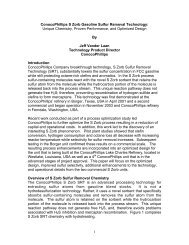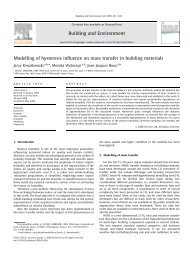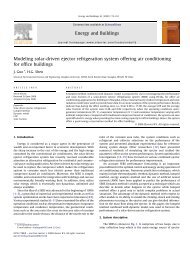Chemical Week
Chemical Week
Chemical Week
You also want an ePaper? Increase the reach of your titles
YUMPU automatically turns print PDFs into web optimized ePapers that Google loves.
margins generated by each customer theyserve, Gonzalez Caloni says. Crompton saysit has stopped doing business with the 30% ofits customers that did not generate a positivemargin. Vendavo research finds that customerswho pay the most per pound are notnecessarily the most profitable for suppliers.Those customers may not pay forservices, or they may receive rebates thatcost suppliers more to deliver than theyare getting paid for, he says.Improved pricing has the potential to bea secular trend within the specialty chemicalsfield because of new managementattitudes toward pricing, and pricing softwarethat allow companies and customersto better understand why price hikes arenecessary, Ottenstein says.“We now see attitude changes” withinspecialty chemical management, most notablyplastic additives, led by CEOs such asCrompton’s Robert Wood, Ottenstein says.Pricing has been a key focus for Cromptonsince Wood took the reins in January 2004.Crompton’s selling prices improved 4% lastyear, compared to 2003. Wood told investorsGupta: Better pricinglifts earnings.Lilley: Aggressivelyraising prices.Wood: Making pricinga priority.in February that too many of Crompton’s customershad been “often lavished with specialservices at no charge,” and the company had“too many products” that did not fully covercosts. Crompton went through a program totrain its sales force to understand the importanceof raising prices and implementingthose hikes, Wood says.Wood says he plans to apply Crompton’spricing practices after the company mergeswith Great Lakes <strong>Chemical</strong> (CW, March 16,p. 8). The combined companies, to be namedChemtura, will focus on improving sellingprices rather than market share gain becauseraw material costs will continue to rise, Woodrecently told CW. “When companies fight formarket share, prices come under pressure. It isan important distinction of how we run ourbusiness,” he says.Supply and demand is tight in many of Dow<strong>Chemical</strong>’s specialty product lines, with nota lot of new capacity coming onstreamin the near term, says Phil Cook, seniorv.p./performance chemicals and thermosets.“Any time product is short asupplier makes choices about which customersit can continue to supply. Thesechoices are not easy, especially when youhave to tell a customer that we can’t supplythem any more,” Cook says.This new approach to pricing isessential to prepare for economicslowdowns and receding raw materialprices, because chemical firms will havealready weeded out customers and productlines that did not deliver a profit, GonzalezCaloni says. It remains to be seen, however,if producers will stick to their new pricingstrategies when raw material costs begin torecede or demand growth slows, analystssay.—KERRI WALSHwww.chemweek.com<strong>Chemical</strong> <strong>Week</strong>, June 8, 2005 25
















